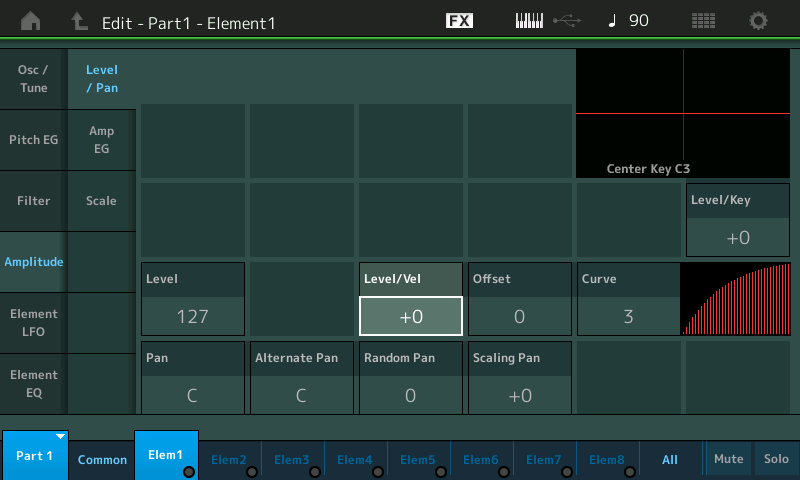Hi All, I think this will be an obvious one, but how do I adjust the velocity sensitivity of a part in performance mode? When I load an initialised performance to make new sounds they always play at the same velocity regardless of how hard I press the keys.
Any advice would be much appreciated.
Cheers Pete
When it comes to Velocity Sensitivity... there is, of course, the global VELOCITY CURVE, which affects all sounds. Additionally, you can adjust the velocity sensitivity of each Element/Operator that make up that Part.
Velocity can be assigned to influence Pitch (Oscillator), Timbre/Tone (Filter), and Loudness (Amplitude)... this is the model in the AWM2 side of things.
Velocity assigned to the FM-X engine is a little different, if applied to a Modulator will affect the Timbre, and applied to a Carrier will affect Loudness.
From the HOME screen of the INIT AWM2:
Press [EDIT]
Press [PART SELECT 1]
You can select the individual Elements using the third row of buttons on the right front panel, the fourth row glows bright for each unMuted Element.
You can select Elements along the bottom of the touch screen, as well.
Select an Element, active Elements will glow brightly.
Touch "Amplitude" > "Level/Pan"
The parameter "Level/Vel" currently at +0 is responsible for making this oscillator velocity sensitive.

+0 = no Sensitivity
+32 = the most linear Curve. For each unit increase to the input there is a corresponding unit increase to the output.
+63 = as you increase above +32, low velocities do not make sound... at +63 only extreme velocity causes sound.
Negative values reverse the application.
The "Curve" here will further shape the response. A "Level/Vel" = +32 and "Curve" = 2 is the most linear
Curve 1 is the Hard Curve - you interpret it as up/down axis is output level, right/left axis is effort... it takes more effort to get loud.
Curve 3 is the Soft Curve - it takes less effort to get loud.
As you increase the "Level/Vel" setting from +0 you will notice the sound gets softer... this is because it now takes more effort to make it as loud. It is very important to know that a setting of +63 is NOT the most sensitive. If you are used to parameter values going from minimum to maximum, please recognize this is NOT one of those. Above +32 you start to lose the ability to play lightly and hear sound... this is used for cross fades...
Say you want to play strings and brass layered but you only want the the brass when you exceed a certain velocity... you can have the brass NOT respond to low velocities... scaling the response here can make all the difference in how your layers respond. This is much smoother than a velocity swap or switch... because each layer can smoothly respond with their own curve, this is far more musical than a velocity "limit".
In other words, a setting north of +33 means that at low velocities the Element will not sound at all... a setting in the 40s for the brass will mean the strings will be able to sound at low velocities but the brass only join in when more effort is put forth.
You tailor the response to your particular playing style. If you don't like how a sound responds, you can change it!
Best Forum response I think I have ever had, thanks so much for the detailed information. My lack of understanding has been alleviated.
Yeah that is one Bad Mister, I just saw a new youtube video from Dom Sigalas Music.... and this video seemed well timed to the topic. In addition to applying velocity to carrier, applying it to the modulator waves along with the envelopes just opened a new universe for me. As Bad Mister mentions in this article about carrier, and modulator waves. I am just getting into creating my own FM-X, so much fun. But we need excellent education, Thanks to Manny, Bad Mister, Moessiers, Dom, and many others. Taming the Beast!

